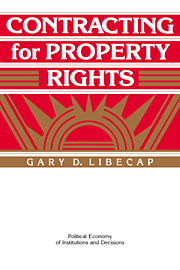Book contents
Series editors' preface
Published online by Cambridge University Press: 24 March 2010
Summary
The Cambridge series in the Political Economy of Institutions and Decisions is built around attempts to answer two central questions: How do institutions evolve in response to individual incentives, strategies, and choices? How do institutions affect the performance of political and economic systems? The scope of the series is comparative and historical rather than international or specifically American, and the focus is positive rather than normative.
Gary Libecap's Contracting for Property Rights is a study of the way property rights institutions are formed. The very substantial literature on these economic institutions has made abundantly clear that property rights matter; that they provide the basic incentive system that shapes resource allocation. What has been largely missing is why they take the form that they do. Why do some property rights structures lead to productive activity and underpin economic growth, while others result in waste and unproductive activity? Libecap's study emphasizes that property rights are formed and enforced by political entities and reflect the conflicting interests and bargaining strength of those affected. Moreover, because today's choices are constrained by yesterday's decisions, history matters.
Libecap's study is a synthesis of theory and history that illustrates and illumines the complexities of property rights formation in four natural resource industries in the American economy. These four empirical cases are contrasting studies of differential success in mitigating the losses from the common pool – losses that occurred even though in each case there were large aggregate gains to be made from reaching agreement.
- Type
- Chapter
- Information
- Contracting for Property Rights , pp. ix - xPublisher: Cambridge University PressPrint publication year: 1990

